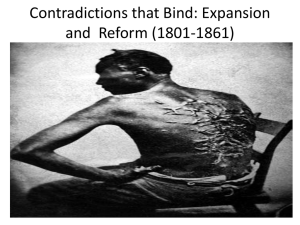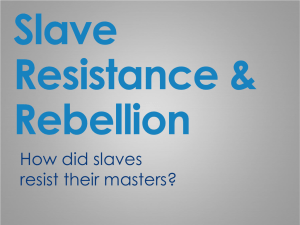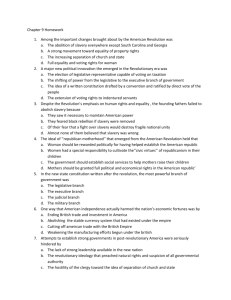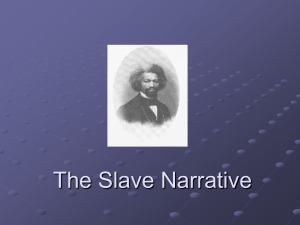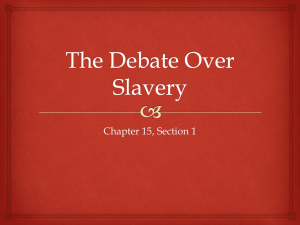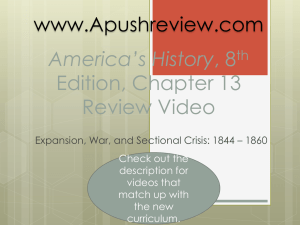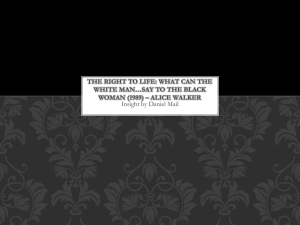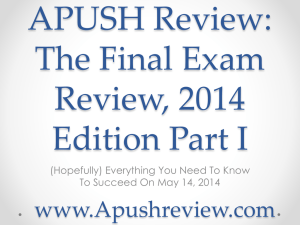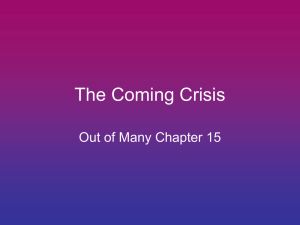Unit 1: Targets 1-8
advertisement
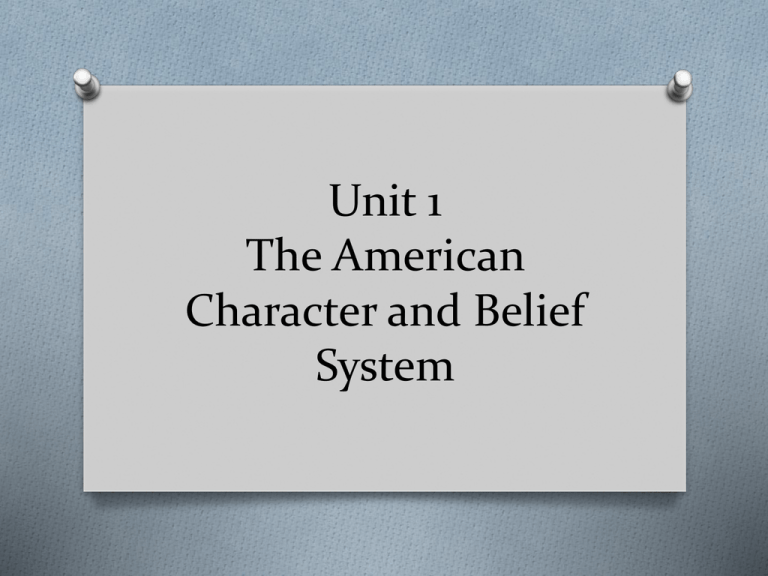
Unit 1 The American Character and Belief System LT1: Political Foundations O Belief in a written constitution (Mayflower Compact and the Fundamental Orders of Connecticut) O Legitimacy through written laws and the description of how self-government will work O God was included in these documents O Despite this fact, they were examples of Enlightenment political thought O Self government (to an extent) from the start (House of Burgesses and the New England Town Meetings) O The wealthy landowners, religious leaders, or appointed governors still controlled most important decisions, but elections within those positions did take place O M and M Theory LT2: Religious Development O New England – Puritans (largest denomination in the colonies) O Middle Colonies – very diverse: Catholics, Puritans (especially those banished), Anglicans, Quakers, etc. O Southern Colonies – Anglican (second largest denomination) O Puritans O New England, Massachusetts Bay Colony O The “city upon a hill” quote from John Winthrop O Strict moral code and the requirement of profession of faith O Church was the focal point of each town O Though they sought religious freedom in coming to America, they were not tolerant of other faiths (or even slight differences within their faith) O Roger Williams O Anne Hutchinson O Prosperity contributed to their decline O Their success both allowed them to prosper, then pulled them away from original purpose O Anglicans (Church of England) O Virginia (Chesapeake region) O Though membership may have been required, this requirement was . . . O Resented because of strong individual spirit O Embraced because it brought status (official Church of England and a connection to the Crown) O Less of a focus than Puritan faith in New England O Churches were more scattered due to the settlement pattern of the farming (plantation) South O A family affair O The Great Awakening O Religious revival era of the mid-1700s O Johnathon Edwards and George Whitefield felt people were becoming too concerned with worldly matters (remember the Puritan decline) O This is the Age of Enlightenment O Field preaching brought thousands to the “hellfire and brimstone” sermons O It democratized religion in America O Women and African-Americans were involved more than ever O It split churches, but this provided more options for people O God became closer to the believer- personal experience O This religious challenge to authority helped foster political challenges to authority O Therefore, it can be viewed as a contributing factor to the American Revolution LT3: Enlightenment O Philosophers of Europe were not just challenging religion with science, they were challenging the old political ideas by introducing new theories of government O Challenging authority across the board O Divine Right gave way to natural rights, consent of the governed, and selfgovernment O Thomas Paine’s Common Sense and Thomas Jefferson’s Declaration of Independence O Connection to Britain is no longer needed O Britain has violated the rights of its citizens (natural rights) O Therefore, we have the “right of revolution” – to overthrown an unjust government O The colonists had a rebellious spirit (LT4) O Consent of the governed is the only legitimate government LT4: Rebellion was a Tradition O Bacon’s, Shays’s, and Whiskey Rebellions were sparked by economic and political grievances against authority that was perceived as arbitrary and distant O Turner’s Rebellion epitomized the great nightmare of the antebellum slavocracy- a large-scale slave revolt O Bacon’s Rebellion - 1676 O Virginia frontiersman are upset that the government in Virginia is not protecting them from Indians O Rebellion burns Jamestown, but ultimately the government crushes it O Outcomes O British government realized the perils of the poor white class O Indentured servitude dwindles and black slave labor increases O Can be seen as the first true challenge to the British government’s authority (100 yrs. before the Revolution) O Shays’s Rebellion – 1787 O Massachusetts farmers are in debt (new states were increasing taxes to acquire money after the Revolution) O Those unable to pay are thrown in debtor’s prison O Shays’s leads attacks on the courts because of these “unfair” taxes and an unresponsive, distant government and the state militia is called out O Outcomes O The government feared rebellions might spread to other states O There was a call to “alter” the Articles of Confederation to provide a stronger authority in matters of national interest and the economy O Whiskey Rebellion - 1794 O Taxation on those who produced whiskey (vital economic good) O Farmers attack tax collectors in protest (unfair taxation – remember the Revolution) O Washington’s force disperses the rebels O Outcome O An early test of the government’s ability to tax O An early test of the government’s ability to maintain law and order O Turner’s Rebellion - 1831 O Slave revolt – physical assault on white southerners O Turner was caught and executed O Outcome O The South imposes harsher restrictions on the slave population and the slave code O The South more passionately defends slavery O Helps inflame abolition movement in the North LT5: The Ideas and Principles of the Articles and the Constitution O Coming out of the Revolution, America wanted a National Government that was weak. O Colonists had viewed themselves as Virginians, New Yorkers, etc. first, and then Americans. Colonial, and then state, pride came first. O They created a loose confederation (league of friendship) with a weak national government – The Articles of Confederation O It failed. O The Articles of Confederation O Successes O It was a national government that was based on the principles the founders and colonists fought for O The Northwest Ordinances O Failures O Virginia Plan called for a strong central government with three distinctive elements O National Supremacy above state sovereignty O The people could directly vote for some national leaders O The central government would be made up of three distinct branches: a bicameral legislature, an executive, and a judiciary O The New Jersey Plan would continue more along the lines of how Congress already operated under the Articles O This plan called for a unicameral legislature with the one vote per state formula still in place O The supporters of the proposed Constitution called themselves Federalists O the Constitution was required in order to safeguard the liberty and independence that the American Revolution had created O Antifederalists opposed the Constitution O They believed that the greatest threat to the future of the United States lay in the government's potential to become corrupt and seize more and more power LT6: Political and Social Conflict in the Early 19th Century O Rapid population growth and geographic expansion caused a great deal of conflict O Democracy began to be championed as an unqualified key to improving the country O Slavery and its expansion O The country's founders left no clear solution to the issue of slavery in the Constitution. Popular sovereignty, amendment, nullification, and secession were all discussed as possible remedies O Northwest Territory O Northwest Ordinances O Division of the territory into states O Formula for establishing these new states with representation O Establishment of religious freedom, the banning of slavery, and provisions for education O Importance: O There is a plan to move west O America values education and sets up an orderly way to expand O Slavery becomes an issue as we expand O Compromise of 1820 O (1) Missouri was admitted as a slave state and Maine (formerly part of Massachusetts) as free, and O (2) except for Missouri, slavery was to be excluded from the Louisiana Purchase lands north of latitude 36°30′ O was criticized by many southerners because it established the principle that Congress could make laws regarding slavery; O northerners, on the other hand, condemned it for acquiescing in the expansion of slavery O Compromise of 1850 North Gets California admitted as a free state Slave trade prohibited in Washington D.C. Texas loses boundary dispute with New Mexico South Gets No slavery restrictions in Utah or New Mexico territories Slaveholding permitted in Washington D.C. Texas gets $10 million Fugitive Slave Law O Who won and who lost in the deal? O North seemed to gain the most. The balance of the Senate was now with the free states, although California often voted with the south on many issues in the 1850s. O The major victory for the south was the Fugitive Slave Law. O In the end, the north refused to enforce it. O Compromise of 1877 O The end of 15 years of Reconstruction O Hayes (R) “defeats Tilden (D) O Military “occupation” ends O North abandons the South O Too long of a process O More pressing concerns out West O South is handed back over to Democratic Rule O Segregated society continues and strengthens O Black underclass LT7: Religious, Philosophical, and Social Movements of the 19th Century O After establishing a new nation, America sought to make its own way – the American experiment O Grounded in optimism and individualism O Even when people begin to see flaws in the American experiment, they sought new thoughts and ideas O And many times this created serious conflicts O Utopian societies O Most of the original utopias were created for religious purposes. O Gradually, utopian communities came to reflect social perfectibility rather than religious purity O Self-reliance, optimism, individualism and a disregard for external authority and tradition O These experiments ultimately disintegrated O The Second Great Awakening O Because religion was separated from the control of political leaders, a series of religious revivals swept the United States from the 1790s and into the 1830s O best known for its large camp meetings O The evangelical impulse at the heart of the Second Great Awakening shared some of the egalitarian thrust of Revolutionary ideals O The new evangelical movement, however, placed greater emphasis on humans' ability to change their situation for the better O Second Great Awakening also included greater public roles for white women and much higher AfricanAmerican participation O Transcendentalism O People, men and women equally, have knowledge about themselves and the world around them that "transcends" or goes beyond what they can see, hear, taste, touch or feel O People can trust themselves to be their own authority on what is right O The transcendentalists led the celebration of the American experiment as one of individualism and selfreliance O Imagination was better than reason, creativity was better than theory, and action was better than contemplation O Ralph Waldo Emerson, Henry David Thoreau, and Walt Whitman O Temperance O By 1830, the average American over 15 years old consumed nearly seven gallons of pure alcohol a year – three times as much as we drink today – and alcohol abuse (primarily by men) was wreaking havoc on the lives of many, particularly in an age when women had few legal rights and were utterly dependent on their husbands for sustenance and support O The temperance movement, rooted in America's Protestant churches, first urged moderation, then encouraged drinkers to help each other to resist temptation, and ultimately demanded that local, state, and national governments prohibit alcohol outright O Abolition O Early Abolitionists called for a gradual end to slavery O The new Abolitionists thought differently. They saw slavery as a blight on America that must be brought to an end immediately. O They sent petitions to Congress and the states, campaigned for office, and flooded the south with inflammatory literature O William Lloyd Garrison O Frederick Douglass O Sojourner Truth O Uncle Tom’s Cabin LT8: Political and Social Impact of Territorial Expansion O Western migration had become central to the American way of life. O This land offered the promise of independence and prosperity O Manifest destiny touched on issues of religion, money, race, patriotism, and morality O Political Impact of Expansion O Representation for new states O Slavery in the territories O The west led the path by having no property requirements for voting O Social Impact of Expansion O In the new western states, there was a greater level of equality among the masses than in the former English colonies. Land was readily available O Louisiana Purchase O Jefferson's plans for the nation depended upon western expansion and access to international markets for American farm products O The most efficient route to market remained along waterways and access to New Orleans remained crucial for the western economy and its settlement. O The belief that the future prosperity of the republic required the expansion of yeoman farmers in the west. . an "EMPIRE OF LIBERTY" O Federalist opposition O Was it constitutional? O Lewis and Clark Expedition O While trying to find a route across the continent, they were also expected to make detailed observations of the natural resources and geography of the west O they were to establish good relations with native groups in an attempt to disrupt British dominance of the lucrative Indian fur trade of the continental interior O The expansion of the nation caused major alterations in American life O Companies begin to build roads (called turnpikes since they charged a fee), bridges, canals O Outright military conflict with native groups increases O A new capitalist economy enormously expands wealth and lays the foundation for the Industrial Revolution O A growing regional distinctiveness of American life emerges O Remember the Compromise of 1820 O Remember the Compromise of 1850 O http://mappinghistory.uoregon.edu/english/ US/US09-01.html

